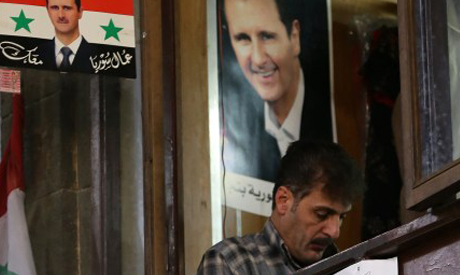
File Photo: A man sits by the window of a shop, decorated with posters of the Syrian President Bashar al-Assad, at the Hamidiyeh popular market in the capital Damascus on November 4, 2015 (Photo: AFP)
Crucial international talks on the Syrian conflict in Vienna this weekend will focus on drawing up an opposition delegation to negotiate with President Bashar al-Assad's regime, sources said Wednesday.
Meanwhile, Western officials dismissed a Russian plan for political reform due to come up at Saturday's talks, with Britain's UN envoy saying it would not be a focal point of the meeting.
The talks, the second in Vienna in less than a month, will bring together around 20 countries and international bodies to try to agree on a roadmap for peace that would include a ceasefire between Assad's forces and some opposition groups.
Diplomatic efforts to resolve the country's more-than-four-year conflict have gathered pace since Russia launched air strikes in Syria in late September.
Previous attempts to bring an end to the conflict, which has killed more than 250,000 and forced millions from their homes, have stumbled over the fate of Assad, who the opposition and Western governments insist must go.
A Western source in Beirut told AFP Saturday's talks would aim for broad international agreement on opposition representatives to discuss a political transition with Assad's regime.
"Each country will be able to submit names which will then have to be reduced to between 20 and 25 people to be divided into two commissions, one on political reforms and the other on security," the source told AFP.
"But everything won't be decided on Saturday; it will take time for everyone to come together," the source said.
A European diplomat posted in Beirut said an international preparatory commission is to start work from Thursday on pulling together the opposition lists as well as on which rebel groups in Syria are to be classified as "terrorist" organisations.
The distinction has been a source of contention between Assad supporters, such as Russia and Iran, and opposition backers in the West and the Arab world.
Russia has submitted a 38-person list, including three former heads of the exiled opposition National Coalition and its current president, Khaled al-Khoja, according to the Western source.
Two representatives of Syria's regime-tolerated domestic opposition and two Muslim Brotherhood members also figure on the Russian list, the source said.
Saudi Arabia had put forward 20 names and Egypt 10, the source said.
A member of the National Coalition criticised the process as serving regional interests over those of the Syrian people.
"Each state wants to send its representatives in the name of the Syrian opposition," said Samir Nachar.
"It's regrettable that the choice does not represent the interests of the Syrian people, and this process will not lead to a settlement of the Syrian crisis," he said.
Neither representatives of the regime or opposition are expected to attend at this stage of the dialogue.
Ahead of the talks, which follow a round on October 30, Russia has circulated an eight-point plan that calls for elections after an 18-month constitutional reform process.
But Britain's UN ambassador, Matthew Rycroft, told reporters Wednesday that Moscow's proposal would not play a major role in the discussions.
"We are aware of the Russian proposals," Rycroft said. "The eight-point plan itself is not central to the discussions in Vienna but Russia is."
Other Western diplomats dismissed the peace plan, presented nearly two weeks ago, as a non-starter because it does not clarify the fate of Assad.
The United States and its European and Arab allies are demanding that Assad be forced to step down at some point in a transition, but Iran and Russia disagree.
One Security Council diplomat described the Russian reform proposal as "back-of-the-envelope stuff" and "not the answer".
The plan was contained in a document that called for forming a constitutional commission from "domestic and outside opposition" groups.
It specified that "the president of Syria will not chair the constitutional commission".
Under the proposal, parliamentary and presidential elections would be held simultaneously after the constitution is approved in a referendum.
But the document did not specify that Assad would not be allowed to stand in those elections.
A high-ranking Lebanese official said the plan also stipulated that the new president would remain in charge of the military and intelligence services.
"That just isn't enough," said the Security Council diplomat, who asked not to be identified.
"It has to be part of the final deal that the end point will not have Assad in power."
Short link: